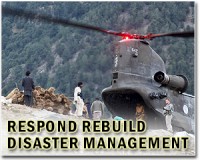| . |  |
. |
Geneva (AFP) May 10, 2011 UN chief Ban Ki-moon on Tuesday warned that no country or city was immune from natural or man-made disasters, as a report underlined the soaring, trillion dollar, economic risks the world faces. Ban told a four-day UN Conference on disaster risk that the devastating earthquake and tsunami in highly-prepared Japan and the ensuing nuclear accident at the Fukushima Daiichi power plant on March 11 gave the world "a grave warning for the future." "As we have learned again and again no country or city -- rich or poor -- is immune," the UN Secretary General said. A report for the meeting of 2,000 experts and officials estimated that the amount of global wealth exposed to harm by natural disasters had nearly tripled from $525.7 billion 40 years ago to $1.58 trillion. Meanwhile, the risk of economic losses in wealthy (OECD) countries due to floods has increased by 160 percent over the past 30 years, while for tropical cyclones the risk has grown by 262 percent, the report estimated. "The risk of losing wealth in disasters is actually increasing faster than that wealth is being created," said Andrew Maskrey, coordinator of the 2011 Global Assessment Report on Disaster Risk Reduction. "Losses from disasters are often at least as great as those a country is experiencing through high inflation or armed conflict for example," Maskrey told journalists. The report by the UN's disaster reduction unit said the damage inflicted by mainly natural disasters on housing, infrastructure and public assets such as schools and hospitals was "soaring in many low and middle income countries." Maskrey suggested that the costs were growing largely because prevention or mitigation measures -- such as land planning in hazard areas or resistant housing, schools or hospitals -- were failing to keep pace with faster and broader economic growth. The report also reiterated warnings about growing pattern of extreme and destructive weather events that has been linked to climate change. Ban insisted that nuclear safety and the threat of multiple hazards added to urgency. "The world's vulnerability to disaster risks is growing faster than our ability to increase resilience," he warned. The average number of annually reported disasters caused by tropical cyclones during the last four decades has tripled, and spans a bigger range of countries, according to the report. However, the UN for the first time predicted a downward trend for mortality in weather-related disasters, especially in East Asia, despite sprawling population growth in flood plains or exposed coastlines. "I think we're now seeing the fruits both of improved development conditions in many countries as well as improvements in disaster preparedness, response and early warning systems," Maskrey said. Nonetheless, many governments admitted in a UN survey that they were having trouble taking preventive steps such as land planning, safe building codes or investing in stabilising slopes, while they developed. "This is really where the world is falling down," said Maskrey, explaining that the vast majority of governments still baulked at longer term planning to reduce the impact of a disaster that could happen every few decades rather than years. Ban insisted that even small investments could make a difference: "By our actions we can either compound disasters or diminish them."
Share This Article With Planet Earth
Related Links Bringing Order To A World Of Disasters A world of storm and tempest When the Earth Quakes
 Quake-hit N.Z. faces 'largest-ever' deficit
Quake-hit N.Z. faces 'largest-ever' deficitWellington (AFP) May 10, 2011 New Zealand is set to post its worst-ever deficit this year, as the country faces a mammoth bill from two major earthquakes in Christchurch, Finance Minister Bill English said Tuesday. Speaking after the IMF estimated the Christchurch tremors would have a greater impact on New Zealand's economy than the recent Japanese disaster on Tokyo's finances, English said the country had to cut its deb ... read more |
|
| The content herein, unless otherwise known to be public domain, are Copyright 1995-2010 - SpaceDaily. AFP and UPI Wire Stories are copyright Agence France-Presse and United Press International. ESA Portal Reports are copyright European Space Agency. All NASA sourced material is public domain. Additional copyrights may apply in whole or part to other bona fide parties. Advertising does not imply endorsement,agreement or approval of any opinions, statements or information provided by SpaceDaily on any Web page published or hosted by SpaceDaily. Privacy Statement |